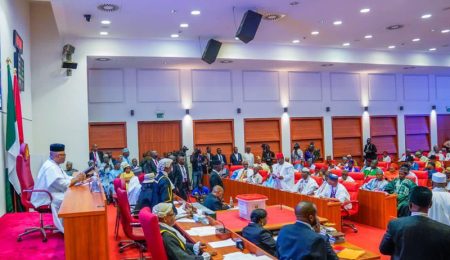Former 2023 Lagos governorship candidate and African Democratic Congress (ADC) chieftain, Gbadebo Rhodes-Vivour, has criticised the Lagos State Government over its recent demolitions in the Oworonshoki community, calling the operations lawless, poorly planned, and anti-poor, accusing the government of ignoring court orders intended to restrain demolitions, stating the approach has consistently disadvantaged residents while serving the interests of wealthy investors and developers.
Speaking In an interview with ARISE NEWS on Tuesday, Rhodes-Vivour expressed deep concern over the process and the lack of empathy demonstrated by state authorities. He explained that the demolitions, which began almost two weeks ago, targeted residents who have lived in the area for over a decade, often at night, with minimal prior notice or consultation.
“There is absolute lawlessness because there’s a judgement. If the state wants the citizenry to respect the rule of law, they must show that example that they also subject themselves to the rule of law.”
He described the demolitions as a charade, in which only a small number of residents received compensation, while the majority were left without recourse. “You see a process that is not properly planned. You see a process that does not have any empathy associated with it. What you see with this charade of payments is that a small group of people are selected, and the majority of residents remain uncompensated.”
Rhodes-Vivour emphasised the importance of proper planning for relocations and compensation, saying that all development should begin at the local government level with full engagement of affected communities.
“Surely, if you have a proper plan, right, it will start at the local government level where interactions will be done with these communities. There should be a proper proposal for how they will move these people. Where are they being moved to? Where are these people that have lived here for so long going to be relocated to? All these will be done with conversations, payments made before these demolitions start to happen.”
He also raised concerns about social inequality in urban development, pointing out that demolitions in low-income communities often make way for luxury projects that poor residents cannot afford. “We cannot constantly be pushing people aside for development, pushing people aside for development. Where is the intentionality to house the poor that cannot afford to live in 150 million flats or townhouses, which make up the majority of legals, and which serve most of the staffing requirements to power this economy?”
Rhodes-Vivour urged the government to embrace inclusive housing strategies similar to council housing in wealthy nations, arguing that urban development should benefit all classes. “You can have inclusive development. Nobody’s against development, but people should also have a private space. There can be beauty in low-cost housing. There can be beauty in that intentionality.” He added.
On the issue of ethnic and class biases, he acknowledged that there may be some truth in claims that demolitions disproportionately affect certain communities or social groups. “I 100% agree that these are anti-poor policies. The destruction disproportionately affects the most vulnerable while benefiting the wealthy and well-connected.”
Rhodes-Vivour criticised government neglect during the construction of the very structures being demolished, highlighting that officials were aware of the buildings’ development but failed to enforce proper planning or approvals. “When a government has sat back and a building has gone all the way to the roof, and they don’t punish themselves for that neglect, what is always the citizen that pays the price for their incompetence, that is very wrong.”
He also highlighted issues with compensation, noting that payments offered by the state were insufficient and failed to cover market rents. “When you’re giving somebody 2 million or 3 million Naira, how long does that last for rents in Lagos? You go and get a self-contained, and now, even including agent fees, you are already at 1 million. And we’re already looking at November. See how fast this year has gone.”
Regarding future urban planning, he stressed that affordable housing must remain a priority and that the government should explore funding models such as luxury development taxes to subsidise low-income housing. “Those funds are supposed to be used directly to fund low-cost housing, right? So that you’re not just taking care of the rich; you’re also taking care of the people that can’t afford it.”
Rhodes-Vivour concluded by reaffirming his commitment to political engagement and his intention to contest the 2027 Lagos governorship election under the ADC banner. “By God’s grace, yes, sir,” he said.
Erizia Rubyjeana
Follow us on:

